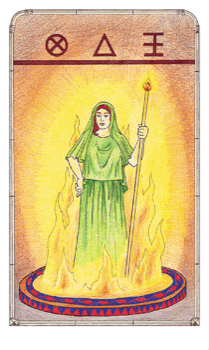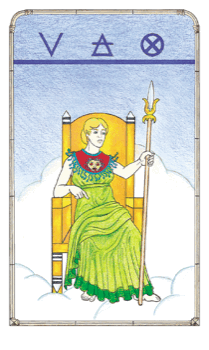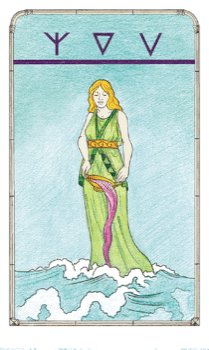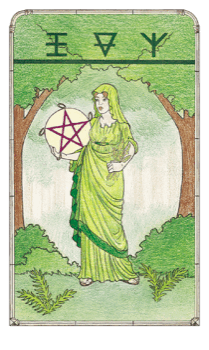 Send
comments about this page
Send
comments about this page Last update: 6 Sep 2022
Because of the secondary quality, Wetness, the Queen is receptive of form imposed from without; in particular, she is receptive of the King's seed and provides its nurturing matrix. Thus she adapts to the elemental form of the suit, rather than imposing a form on it (as does the Dry King). The Celestial Fire of the King stirs the Abyssal Waters of the Queen and life is born in her depths.
In the King and Queen the active qualities (Hot or Cold) dominate, so the King and Queen are pre-eminently sources of authority. Since the Knights and Pages are dominated by passive qualities (Wet or Dry) they are not a source of authority, in spite of being willful (Dry, Pages) or judgmental (Hot, Knights).
As a consequence of her Wetness the Queen is also inclined to manifest her authority by conforming with circumstances, rather than opposing them (which the King does, as a consequence of his Dryness). Such adaptation is characteristic of the archetypal parent, whom the Queen represents. The conforming characteristic of Wetness is also a source of empathy, compassion and understanding for the Queen, especially as Great Mother.
The Queen represents the parent in her suit. In the downward path IOVE she is the Object towards which the creative Impulse is directed; she steadfastly carries the Ovum, and nurses the new creation at her Overflowing breasts. She is Ops, the Goddess of Abundance, and in Latin Ops means the power to care for another.
In the upward path EVOI the adolescent Knight may mature into the wise parent, symbolized by the Queen, by learning steadfastness and responsibility and thereby acquiring her quiet authority. Like the steady movement of the calm Ocean, her progress is invisible but inexorable.




From the Cold quality of her rank the Queen gets her powers of mixing, relating and joining, and thus her friendliness, attractiveness, warmth, loyalty, love and sincerity. From the Wet quality of her rank she gets her ability to conform and adapt, and thus her sympathy, understanding, practicality and kindness. From the Hot quality of her suit she gets discrimination and expansiveness, and thus her strength, energy, virtue, loyalty and honesty. From the Dry quality of her suit she gets her will, concreteness and grounding, and thus her stability, strong will, practicality and fondness for nature.
If there is an excess of Dryness, then the Queen of Wands may be domineering, cruel or overly strict. If there is an excess of Coldness (lack of discrimination), then she may be unstable, jealous, or ruled by passion. On the other hand, an excess of Hotness may lead to intolerance, and an excess of Wetness (indefiniteness) may result in deceit, infidelity and a lack of self-control.
Image: Hestia as Lady of Fire. A round hearth-fire, such as would be found in a Mycenaean megaron (hall). In the roaring flames is the image of a crone, with veiled head, in a yellow-green peplos (robe).
Commentary: Hestia is Lady of Fire because she is the hearth fire, the center around which home life revolves. She was rarely depicted anthropomorphically, since every hearth is her altar, but we occasionally find her as in this image (Oswalt 145).
The Hotness of the Swords makes this Queen especially discriminating, and so she is extremely perceptive, sharp-witted and intelligent, though in the exercise of her wit she may be cruel, malicious, perfectionist, narrow-minded, bigoted or even deceitful. Since the Hot is separating, the Queen of Swords may be aloof, untouchable and lonely.
The Queen of Swords lacks the Dry quality, and so she may lack practicality; she runs the risk of living in an idealistic ivory tower. This may be amplified by the Coldness of her rank, since that tends to turn her inward and away from the world.
Image: Hera as Lady of Air. Holding her cuckoo-tipped scepter, she sits enthroned in the sky among clouds; she wears a yellow-green peplos (robe).
Commentary: Hera is Lady of Air because (1) she is the wife of the Sky God, (2) she gives the gift of prophecy, and (3) she is a Bird Goddess and therefore traditionally associated with the Air element (Dexter 120-3). See 2.Empress for more on Hera.
However, as a consequence of the qualities of Water, the Queen of Cups is especially adept at understanding the relational, inward-turning flow - the subconscious source and sink of emotion. She is loving, kind, warm-hearted, gentle, easy going, and a good friend or mother. Nevertheless, through her twofold Wetness she may be susceptible to a variety of conflicting influences, and be unreliable through lack of stability (Dryness).
Image: Aphrodite as Lady of Water. In a yellow-green peplos (robe), around which is wrapped a golden zone (girdle), she stands on the billowing foam above the blue-green sea.
Commentary: Aphrodite is Lady of Water because she was born of sea foam and because she rules the emotions (suit of Cups). Like Poseidon, she is of the first Olympian generation, since she was born parthenogenically from Kronos' genitals. Green is her color because she is a Fertility Goddess and because of her traditional association with copper (it is her metal and she is called the Cuprian because Cupris - Cypris - is her home). See 2.Empress for more on Aphrodite.
The Dryness (formative power) of the Earth is dominated by the Cold and Wet of the Water, and thus engenders a feminine strength (Dry) that is both relational (Cold) and conformable to the flow of things (Wet). Thanks to the Dryness she is also stable, both emotionally (Water) and financially (Earth).
However, since the Queen of Pentacles lacks Hotness, she may be foolish, moody or indecisive (lack of discrimination = Hotness), and she may be overly dependent or weak (lack of ability to separate = Hotness). She may be changeable as a consequence of her Wetness as well as the absence of Hotness.
Image: Demeter as Lady of Earth. With veiled head, she wears a yellow-green peplos (robe) and holds a torch before her. She wanders through a dense, green forest.
Commentary: Demeter is Lady of Earth because she represents the fruitful Mother Earth, the source of all resources and ultimate basis of material well-being and prosperity (suit of Pentacles). See 2.Empress for more on Demeter. In this image we see her searching for Persephone.
 Send
comments about this page
Send
comments about this page
Last update:
6 Sep 2022